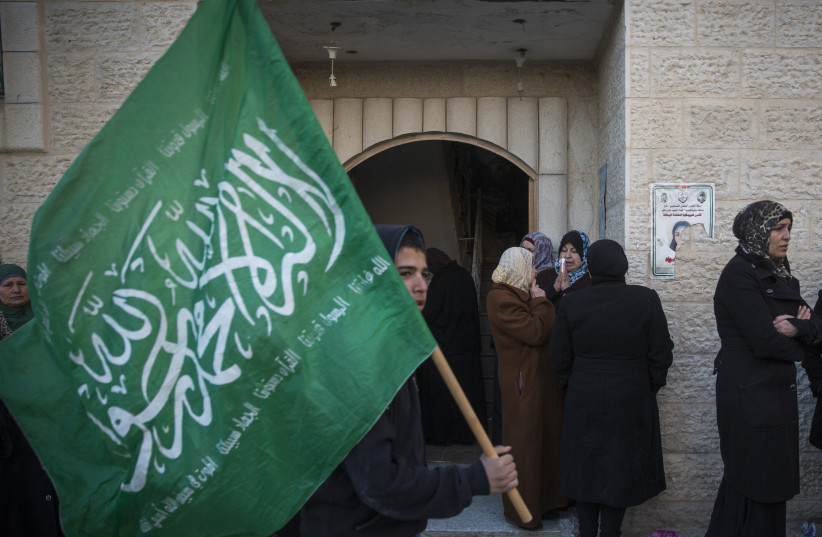And on that October day, waves of evil engulfed southern Israel. It was a day of bloodshed and destruction, as anti-Zionism and antisemitism reinforced each other; a day of elders slaughtered and toddlers kidnapped, of partygoers mowed down and synagogue-goers’ corpses desecrated. It was a day that imposed unspeakable traumas on thousands of survivors who, though lucky to be alive, will carry the emotional and physical scars with them to their last breaths.
And this was the best day in Palestinian history? This was their great victory? This was their best shot? It says so much about them – and, by contrast, about us, too.
This bloodthirstiness is Palestinian political culture’s fatal flaw. The sadism of October 7 should prove to all the Blame-Israel-Firsters how perverse the Palestinian terrorists they romanticize are. The bloodbath illustrates why Israel must defend itself vigorously, why Palestinians must not control the hills one RPG shot away from Ben-Gurion Airport’s runways, and why it is so hard to trust these people as a people.
Palestinians plan on victory through atrocity
The rampage through southern Israel illustrated the Palestinian victory plan. And it once again confirmed Golda Meir’s quip turned cliché: “If the Arabs put down their weapons today, there would be no more violence. If the Jews put down their weapons today, there would be no more Israel.”
Palestinians export this hatred abroad, too. It’s why the biggest Palestinian happening on campus is not Palestinian National Day but Israel Apartheid Week – these totalitarians are addicted to knocking us down, not building themselves up.

No nationalist movement can succeed if its identity pivots solely around negating others. You end up only emitting bile, not glue. The hatred boils over, breeding dictatorship, not democracy; perennial wars, not shots at peace. That nihilism explains why Palestinian internal politics is so factionalized and violent, let alone why the international community has never succeeded in bribing Palestinian leaders into accepting the very existence of “the Zionist entity.”
Clearly, this critique doesn’t apply to every individual Palestinian. It does, however, describe a historical phenomenon and a deeply embedded cultural tic. It doesn’t mean that peace with Palestinians is unattainable. Note, when Meir spoke, she said “the Arabs.” Yet, many Arabs, adjusting to history and Israeli power, eventually made peace with Israel – or at least achieved a nonviolent toleration.
Acknowledging Palestinian nihilism does, however, suggest that calling for “Peace Now,” with this leadership, perpetuating this political culture, is foolhardy. It will continue to lead Israel and Western do-gooders into the same kind of unsurprising “surprises,” wherein Israel disengaged with Gaza, expecting a peaceful democratic entity, yet spawned Hamasistan.
ZIONISM FLOURISHED because we became tree-planters, not just firefighters, we were building toward something, not just running away from our enemies. Admittedly, then as now, some Zionists built too much on anti-antisemitism, or anti-anti-Zionism. But even Theodor Herzl, who is often considered the ultimate traumatized, garrison Zionist, became more positive – and more visionary – as his activism intensified.
Ultimately, we remember Herzl for his declaration that “we are a people” and that Zionism was a return to Jewishness even before we would return to the Jewish homeland.
This Jew-jitsu defined Zionism, our incredible skill in turning all the negativity from millennia of hatred and suffering into a positive, proactive, humanity-affirming movement. That’s why Zionist heroes were never just generals like Moshe Dayan and Ariel Sharon, but intellectual ideologues like Herzl and Meir, David Ben-Gurion and Menachem Begin.
That’s why Israel’s greatest historical moments are not just based on military exploits but on great leaps forward collectively, from declaring statehood in 1948 to becoming a start-up powerhouse decades later. And that’s why I keep championing a new Israeli history, not stretching from war to war, or peace plan to peace plan, but from decade to decade.
That timeline emphasizes culture, ideas, trends, and the political, diplomatic, economic, and existential achievements. “We do not rejoice in [military] victories,” Meir taught. “We rejoice when a new kind of cotton is grown and when strawberries bloom in Israel.”
During the worst days of the Palestinian campaign of suicide bombing from 2001 to 2003, Hamas leaders often scoffed about the Jews’ weakness in mourning every innocent killed. In fact, dictators who willingly sacrifice their own people as pawns are called “strongmen,” while liberal democrats who argue about everything and mourn every casualty often look weak.
Here, too, they miscalculate.
Our communal solidarity and ability to lament individual loved ones murdered are among our great Jewish strengths and our secret democratic weapons. Because we mourn the dead reverently, we live life vigorously – creating a remarkably successful and resilient society. Meir also understood that when she said: “Those who don’t know how to weep with their whole heart, don’t know how to laugh either.”
So, yes, all of Israel, all of the Jewish people, in fact much of the liberal-democratic world, is crying wholeheartedly for each death, one by one – and crying out that Hamas better not harm those hostages and must free them immediately. But, like the tears of the first pioneers fleeing the pogroms, the tears of the Holocaust survivors fleeing Europe, and the tears of the Jews from Arab and Muslim lands also fleeing anti-Zionist Jew-hatred, our tears today catalyze; they don’t paralyze.
As we mourn deeply, we vow to live life more fully, to defeat the haters existentially, while fighting them more intensely – to crush them physically, too, restoring the deterrence so essential to keeping us safe while cursed by such evil neighbors.
The writer, a senior fellow in Zionist thought at the Jewish People Policy Institute, is an American presidential historian and, most recently, the editor of the three-volume set Theodor Herzl: Zionist Writings, the inaugural publication of The Library of the Jewish People.
